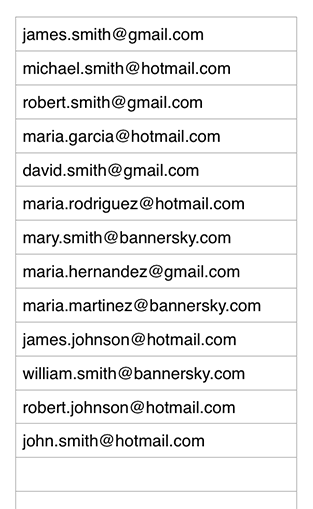New Suggestions To Deciding On An Email List Website
New Suggestions To Deciding On An Email List Website
Blog Article
What Should I Think About Prior To Buying An Email Database Of Hospital Ceos?
It is essential to think about the following factors when purchasing an email database of hospital CEOs. The information must be reliable, accurate and compliant with all legal regulations. Here is a breakdown of the most important factors to be considered:1. Data Accuracy, Quality and Reliability
Source of Data: Ensure that the list provider has reliable sources like professional directories for business, databases or verified opt-ins. The reliability of data reduces the possibility of incorrect data.
Verification Process Verify the frequency at which data is updated. Emails that aren't validated may result in high bounce rates, which can affect your reputation as well as marketing efforts.
Segmentation and Filters Be sure that the list is able to be segmented according to geographic location, hospital size and the type of hospital (e.g., private or public) or by specific areas of particular expertise. Marketing campaigns focused on specific areas of expertise are more effective than those that are broader in scope.
Email Deliverability: Find out whether the service provider provides guarantees regarding deliverability rates. A high bounce rate can adversely affect your domain's email reputation for sending.
2. Legal Regulations
Data Privacy Laws. Make sure that your email lists adhere to regulations like the General Data Protection Regulation in Europe as well as the California Consumer Privacy Act in the U.S. Verify that data was collected in accordance with consent and used responsibly.
CANSPAM Act - In the U.S.A., you must make sure that your list is compliant with the CANSPAM Act. The Act governs commercial email. Penalties may be imposed for non-compliance.
Permission-Based Marketing: Make sure the CEOs of your companies have given their consent to receiving emails. Sending unwelcome emails could be punished and hurt the reputation of your business.
3. Provider Reputation
Testimonials and Reviews: Study the credibility of the business through online reviews, testimonials, and case studies. You will find positive reviews on similar products from buyers.
Transparency: Make sure the provider is transparent in how data is collected and updated as well as how it is maintained. Avoid providers who are unable to explain the process they use for data collection.
Customer Support: Look for companies that provide a robust level of customer service. It is possible that you require assistance with technological issues, data customisations, or legal obligations.
4. Cost and Value
Pricing Model: Different service providers have various pricing structures. (For instance they may offer pay-per lead models or subscriptions, as well as flat fees). Review the options and ensure that the price is compatible with your budget and the expected return on investment (ROI).
Refund Policy: Find a service provider that offers the option of refunds or replacements for inactive emails or contact numbers that aren't in compliance with your needs.
Other Services: A few companies offer additional services like the management of email campaigns, integration with CRM or marketing automation. Take a look at whether these add-ons can benefit your business.
5. Data Usage
Exclusive vs. Lists shared: Identify if the list of email addresses belongs solely to your company or is shared with other customers. Exclusive lists can lead to better engagement. Lists that are shared can cause people to become fatigued due to the constant contact.
Know the difference between ownership and licensing. To access it continuously it is possible to pay for recurring fees.
6. Data Integration and Format
Compatibility with CRM: Make sure that the email list you are using can be integrated seamlessly to your email marketing or CRM tools. Look for formats that are common, such as CSV or Excel.
Easy of Use: Assess the ease of use to manage your data, filter it and segment it after purchasing it. If you need to manipulate the data in a complex way, it might not be worth your investment.
7. Ethical Aspects
Relevance of Outreach Hospital CEOs are highly-motivated professionals. Ensure that the purpose of your outreach is in line with their role and beneficial for them. A message that is irrelevant or invasive can damage your reputation.
Beware of spamming: flooding recipients with multiple messages could be viewed as spam and can damage the reputation of your email provider. Make sure you schedule a timed, thoughtful campaign to avoid this.
Conclusion
If approached with care, purchasing an email list of hospital CEOs may be a worthwhile investment. Consider the accuracy of your data as well as its legal compliance and relevancy, to ensure that you are able to reach out effectively and get a good response. Always research your provider thoroughly and understand the terms of data usage to maximize the return on your investment while maintaining moral and legal guidelines. View the pro hospital ceo email list for site recommendations.
What Do I Need To Be Thinking About When Buying An Oncologist Email List?
Take note of these points when buying an oncologist's email list. This will ensure that the list you purchase is of high-quality, in compliance to the law, and is tailored to your business goals. These are the most important considerations. Quality of data and accuracy
The source of data: Check that the information comes from reliable and reputable sources such as professional associations, medical directories or healthcare databases. Avoid lists that are from unverified or unknown sources as they may contain outdated information.
Verification Process: The list provider should have a robust verification procedure to make sure that all email addresses are current, valid and accurate. The provider must regularly update and cleanse the list by removing duplicate, inactive or incorrect contact details. This will improve quality of service.
Segmentation - A quality email list for doctors should have segments. Being able to filter the list by subspecialties (e.g., pediatric oncology, surgical oncology, hematology-oncology), geographic location, years of experience, or institution allows for more targeted outreach, increasing the likelihood of engagement.
2. Compliance with Legal Regulations
Data Privacy Regulations – Ensure that your email lists comply fully with all relevant regulations. This includes the General Data Protection Regulations, also known as GDPR which is in Europe and the California Consumer Privacy Act, or CCPA which is in the U.S.A. The email address must be processed and gathered legally as well as ensuring the privacy of data.
Compliance with CANSPAM Act - For campaigns that originate in America, check that the mailing list complies with CANSPAM Act. The CANSPAM Act regulates commercial emails. It is important to include a clear opt-out button in every email. Also, make sure that your subject lines are correct and don't mislead the recipients. Infractions to the law could be punished and your reputation could be damaged.
Opt-In Consent: Make sure the email addresses on the list were obtained by opt-in consent. Oncologists have to consented in order to be able to receive marketing material. This is a method to ensure privacy laws are followed and reducing any risk for spam complaints or legal issues.
3. Provider Reputation
Reputable Providers - It's crucial to buy your list from an industry leader with a good reputation. To determine their credibility, you can look up their past records reviews, see testimonials, and reviews or case studies. Established companies tend to have more precise and legally and legal data.
Transparency: The service provider must be open about the way in which the data is sourced and how often it is updated and what verification methods are employed. Lack of transparency is a major red flag that may indicate poor quality data.
Customer Support: Choose an online vendor that can provide prompt customer support in the event you need help with your checklist or if there are concerns regarding integration or segmentation.
4. Cost and Return on Investment
Pricing Structure: Be sure to understand the pricing model. Are they based on of the number or contacts or is it built around subscriptions, flat fees or other factors. Price should be compared to your marketing budget and the ROI (return on investment).
Refund and Replacement Policy: An established provider will provide a refund policy or replacement policy for invalid emails or email addresses that are no longer valid. To safeguard your investment ensure that you have go through the terms and conditions prior to you make a purchase.
Value for money: Don't be focusing exclusively on price. It might be tempting to purchase a less expensive list, but it may end up causing your campaign damage if outcomes aren't delivered as promised and low engagement. Prioritize value and ensure your list includes relevant and accurate data.
5. Data Usage and Ownership
It is essential to clarify whether the list is used only once, or whether you have the list and you can make use of it for as long as you want. If you're planning on running multiple campaigns, buying the list will allow you to have more flexibility and longer-term value.
Exclusive vs. Shared Lists: Find out whether the list is exclusive to you or sold to multiple buyers. Exclusive lists are more useful due to the fact that they reduce audience boredom, leading to improved engagement.
6. Data Integration and Format
CRM Compatibility. Check that you can import the list easily into your CRM system or emailing program. The list should come in a format that is simple to integrate, such as CSV or Excel.
Simple Segmentation Your CRM should allow you to segment and manage the list. You can customize your marketing campaigns more effectively if you are able to filter quickly by criteria such as oncology subspecialties and geographical locations.
7. Ethical Questions
Relevance in Messaging Oncologists are highly-skilled professionals with extremely demanding schedules. Make sure your message is related to their profession or interests. Examples include medical equipment, ongoing education, or pharmaceutical developments. Unrelated emails could lead to a poor brand reputation and low engagement.
Avoid Spam. Avoid sending too many emails or send unsolicited email messages. These could result in spam complaints. Your audience should be contacted at a rate that is reasonable to maintain their interest without overwhelming them.
Conclusion
When purchasing an email list of cancer specialists, you should prioritize data accuracy and legal conformity. Also, consider the reputation of the company you choose to use. Ensure that the list is segmented, properly validated, and tailored to the audience you want to reach. When you consider these aspects, it's possible to design an efficient, compliant strategy for outreach that will maximize the engagement of your audience while also delivering impressive results. Check out the top oncologist email list for blog guide.